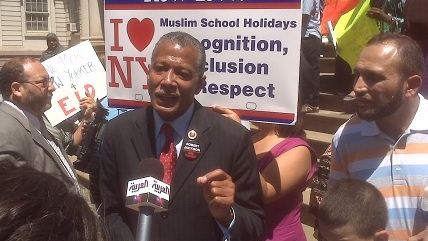Religion in the Public Sphere Makes a God-Awful Mess
Of theology, trigger warnings, and tolerance

In the 213 years since Jefferson wrote of the First Amendment's 'high and impregnable' wall between church and state in his letter to the Danbury Baptists, debate regarding private faith and the public sphere has waxed and waned. Get ready for some more waxing.
In recent days, Muslims won two victories, one major and one minor. In New York, Mayor Bill de Blasio announced that the city schools will close to observe the Muslim holidays of Eid al-Fitr and Eid al-Adha. To the north, officials at McGill University in Montreal signified their openness to a request by Muslim students for women-only hours at the school gym. If McGill approves the request, it will follow the lead of Harvard, which created women-only hours at one of its gyms several years ago.
Given that schools in New York and across the country shut down for Christmas, it seems nearly impossible to argue in any principled way that Muslim holidays should receive less recognition, or none at all. (Nor is it easy to understand why anyone would want to.) Governmental holidays for one faith's observances but not another's is blatant religious discrimination.
Yet closing schools for Eid has met resistance in, for example, Montgomery County, Md. — a well-off, well-educated and heavily Democratic suburb of D.C. where 'celebrate diversity' bumper stickers are, if not legally required, certainly de rigeur. Last year, Montgomery erased all mention of religious holidays rather than include any Islamic ones.
New York still could face a logistical quandary. De Blasio also has promised to close schools on the Lunar New Year (which falls in late January or early February) for the benefit of Asian-Americans. Some Indian-Americans want schools to close around the Hindu Festival of Diwali (which falls in late October or early November). Throw in Thanksgiving, Christmas, the New Year, some snow days, the Buddhist celebration of Vesak and maybe something for New York's Wiccan community, and pretty soon New York won't have many school days left.
***
Closing college gyms to men opens a different can of worms. Five years ago, the Supreme Court ruled that Christian student groups, at least those at public universities, cannot limit eligibility for leadership only to Christians and heterosexuals; gay and non-Christian students must be eligible, too. Since then, Christian groups, their opponents and their defenders at both public and private institutions have tussled over membership and recognition rules.
Imposing women-only hours at the school gym would seem to fly in the face of equal-treatment precepts requiring the acceptance of all comers. Then again, most college sports are segregated by gender. So are fraternities and sororities.
Colleges and universities have long capitulated to identity politics in residential life by creating segregated dorms, 'ethnic-themed' houses, and similar arrangements for various subgroups within the student body. This might have reached its logical terminus at Wesleyan University, which maintains a residence called Open House. According to the university, 'Open House is a safe space for Lesbian, Gay, Bisexual, Transgender, Transsexual, Queer, Questioning, Flexual, Asexual, Genderfuck, Polyamourous, Bondage/Disciple, Dominance/Submission, Sadism/Masochism (LGBTTQQFAGPBDSM) communities and for people of sexually or gender dissident communities.' Probably not a safe space for devout Muslims from Harvard or McGill, though.
A few hours at the gym qualify as a minor accommodation. But suppose Hasidic Jewish students ask for gender-segregated buses. Or classrooms. Single-sex instruction is coming back into vogue for pedagogical reasons, but should it return for the sake of religious scruples? Suppose some religious students somewhere demand an end to Gay Pride week. That might seem far-fetched, but then so does a university residence for people who like their sex with ropes and whips.
***
Yet even as schools become more open about sexual variance among the students, they are growing more Victorian in the classroom. Many have instituted 'trigger warnings' to give sensitive students notice of potentially upsetting material. Jeannie Suk, a law professor at Harvard, writes that 'a dozen new teachers of criminal law at multiple institutions have told me that they are not including rape law in their courses, arguing that it's not worth the risk of complaints of discomfort by students.'
If institutions censor content for some reasons, why not others? Oxford University Press is now warning writers not to mention bacon, pork or pigs in their works, to avoid offending Muslim or Jewish readers. No word yet on whether it will ban references to birth control to avoid offending the pope.
Hobby Lobby, however, is free — as a private organization should be — to refrain from paying for its employees' contraception. The Boy Scouts are free to reject gays as Scoutmasters, gay-rights groups are free to exclude Christian or Muslim fundamentalists from their ranks, churches are free to exclude nonbelievers, and Curves is free to market itself as a women-only health club chain.
Figuring out where to draw the lines is not so hard with purely public institutions such as schools: Government must treat everyone equally and show favoritism toward none. And it's not so hard with purely private institutions such as churches, either: Individuals and groups have the right to determine how they will behave (whether they choose correctly is an entirely different matter) but they have no right to determine how others will behave.
Yet many institutions—universities in particular—are neither fully public nor fully private. And when they try to mediate among competing claims and values, the result is usually a god-awful mess.


Show Comments (103)